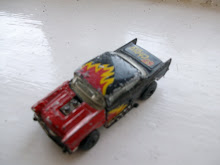Comic books based on a world I can identify as being this one haven’t generally interested me, unless there’s a good hook. I like a bit of escapism in this respect, whether it be Dr Manhattan walking around Mars with his dick out or Frank Castle mowing down rows of gangsters despite being well into his 50s.
Despite that, I found myself enjoying Alex Robinson’s Box Office Poison, even though I essentially thought most of the characters were incredibly unlikeable. Set in mid 90s New York, we initially follow Sherman, recently out of university and working as a clerk in a bookstore, a job which he initially dislikes and later hates.
Sherman, to be blunt, is a bit of a fuckwit and his misfortunes throughout tend to be of his own making. Though we can be sympathetic to his childhood problems (father walking out, mother dying of cancer), his habit of engaging in unsuitable relationships is the root of his inability to get happy. Throughout, I found myself questioning not only why he stuck with his girlfriend, a borderline alcoholic journalist, when he clearly wanted away with someone else. That it apparently came down to some issues with his old man, who seems to have a problem with monogamy, left a feeling of “is that all?”
Our man is also an aspiring writer – but lacks any kind of experience to make it. The one time we get to see his work, it’s a mediocre effort making in-jokes of his job. Also wanting to make it in the creative scene is Sherman’s best friend, Ed, who has long dreamed of working in comics. He gets a small break as an assistant to bitter old man Irving Flavor, who signed a bad contract as a young man and sees dollar none when one of his creations later becomes the star of a hugely successful film franchise. Ed, one of two characters I found myself hoping come out of things OK, takes it upon himself to find some “justice” for his boss, and this becomes one of the main plot strands in the second half of the book.
Where Robinson has his best writing moments is the portrayal of New York as a cruel, harsh place. Albeit one that is apparently nearly entirely occupied by white people, so it seems. We occasionally see two teenage runaway girls in passing (shoplifting, spying on Sherman having sex with his girlfriend) and think little of them until one is left alone by the other and meets a violent fate. The depth of this moment is not made clear until near the end, whereupon it hits hard.
Literary cliches aside, the art is great throughout. It being in black and white suits and some of the scene shifting is brilliant, all of which makes up for scripting shortcomings. Real life might not be as exciting as whatever Batman gets up to, but it's nice to read about people who have lives just as fucked up as your own.
Thursday, 24 November 2011
Subscribe to:
Post Comments (Atom)

No comments:
Post a Comment